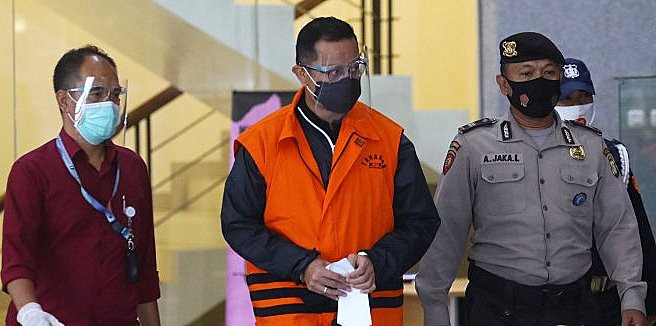COVID-19: State of emergency doesn’t justify lack of transparency
The prevalence of economic bias in the policy design without wider participation of stakeholders in the democratic governance is argued to have increased the risks of corruption.
Change text size
Gift Premium Articles
to Anyone

T
he COVID-19 pandemic has exposed the government to a form of corruption that stems from the emergency procurement of goods and services intended for serving the economic recovery agenda.
Studies, including by Federica Cacciatore et al. in 2022, show that there is a link between economic recovery programs with increased cases of corruption. This has also played out in Indonesia, where its policy responses toward COVID-19 have heavily focused on the goals of economic recovery (Greg Fealy, 2020).
To activate this policy function, the Finance Ministry allocated Rp 744.75 trillion (US$53 billion) in 2021 for the economic recovery agenda across the country via the establishment of social safety and healthcare programs (The Jakarta Post July 19, 2021).
Such a hefty budget implemented under an economic-oriented policy called for greater public monitoring to minimize corruption risks. However, questions remain as to whether such transparency of information existed in the emergency crisis situation to mitigate corruption risks, and what role the economic-oriented policy played in this risk.
Corruption risk is defined as the potential of mismanaging the allocated public funds for procuring public goods in an urgent manner, such that it does not address the needs of the communities and instead serves powerful interests. The government’s ambition to restore the nation’s economy as quickly as possible has led to such a prompt response without a detailed planning system – from procurement and distribution to the process of administering the public goods.
In the case of COVID-19 vaccines, Presidential Regulation No. 99/2020 allows direct procurement of vaccines by directly appointing the suppliers of vaccines, such as CoronaVac, to accelerate economic recovery. However, the procurement contracts are still yet not available for public monitoring and there have been issues with the transparency of vaccine distribution and registration (Transparency International, 2022). Consequently, there have been cases of rapidly expired vaccines (Reuters, March 1, 2022) resulting in wastage.
It is argued that vaccines were wasted because they were delivered to faraway places or because people did not turn up. However, should the government have had an adequate system of vaccine registration, they would have known exactly how many doses they needed to deliver to different locations.
Transparency of other information, such as when and where the vaccines were delivered, would also have enabled the public to know which health facilities had available vaccines. Through this system, vaccines are administered to the right beneficiaries and therefore, public funds are spent effectively.
The option for bansos (short-term social aid) was also driven by economic interests. The distribution of short-term social goods saved the public budget more, compared with the daily provision of basic needs during the total lockdown, as mandated by the Health Quarantine Law. Despite this, the need to procure and distribute the social assistance promptly led to a corruption case involving then-social affairs minister Juliari Batubara, who directly appointed a partner for procurement and stipulated fees for each package.
The lack of good governance in data registration, such as inadequate data infrastructure and transparency in registration, has also led to prevalent cases of mistargeted social aid distribution. Cases of bribery impacting the beneficiaries and other forms of petty corruption were also common on the ground (Kompas, Aug. 3, 2021).
The prevalence of economic bias in the policy design without wider participation of stakeholders in the democratic governance is argued to have increased such risks of corruption. Policy change could have been pursued through an advocacy coalition framework, which entails policy learning between the government and other entities to formulate a better policy response through an exchange of policy beliefs (Elizabeth A. Shanahan et al., 2011)
For instance, the Corruption Eradication Commission (KPK) has shown in its policy briefs that the government should be transparent in the procuring of vaccines through an e-procurement system (Republika, Feb. 2, 2021) and that the vaccines should not be bought in large quantities before the result of phase three trial was out. However, the central government neglected the KPK’s policy brief, leading to cases of public-fund wastage as the vaccination rollout has shown.
Despite this, there are good case studies of local governments incorporating transparency frameworks that emerged from policy learning with civil society organizations. For instance, the Semarang city government implemented a transparent system of vaccine distribution through the formulation of a public dashboard. Other regions, such as West Kalimantan, also publicly announce the documents of all goods it procured, the payment status and the firms that provided the goods.
These case studies show how transparency could still be instilled in the emergency situation and, thus, minimizing corruption risks and budget wastage due to unmonitored spending. It is therefore critical to scale up this good governance practice to the central government functions.
***
The writer is a research and advocacy volunteer at LaporCOVID-19 and a Master of Public Policy and Management student at Monash University Indonesia.









